Chicago-Kent Magazine
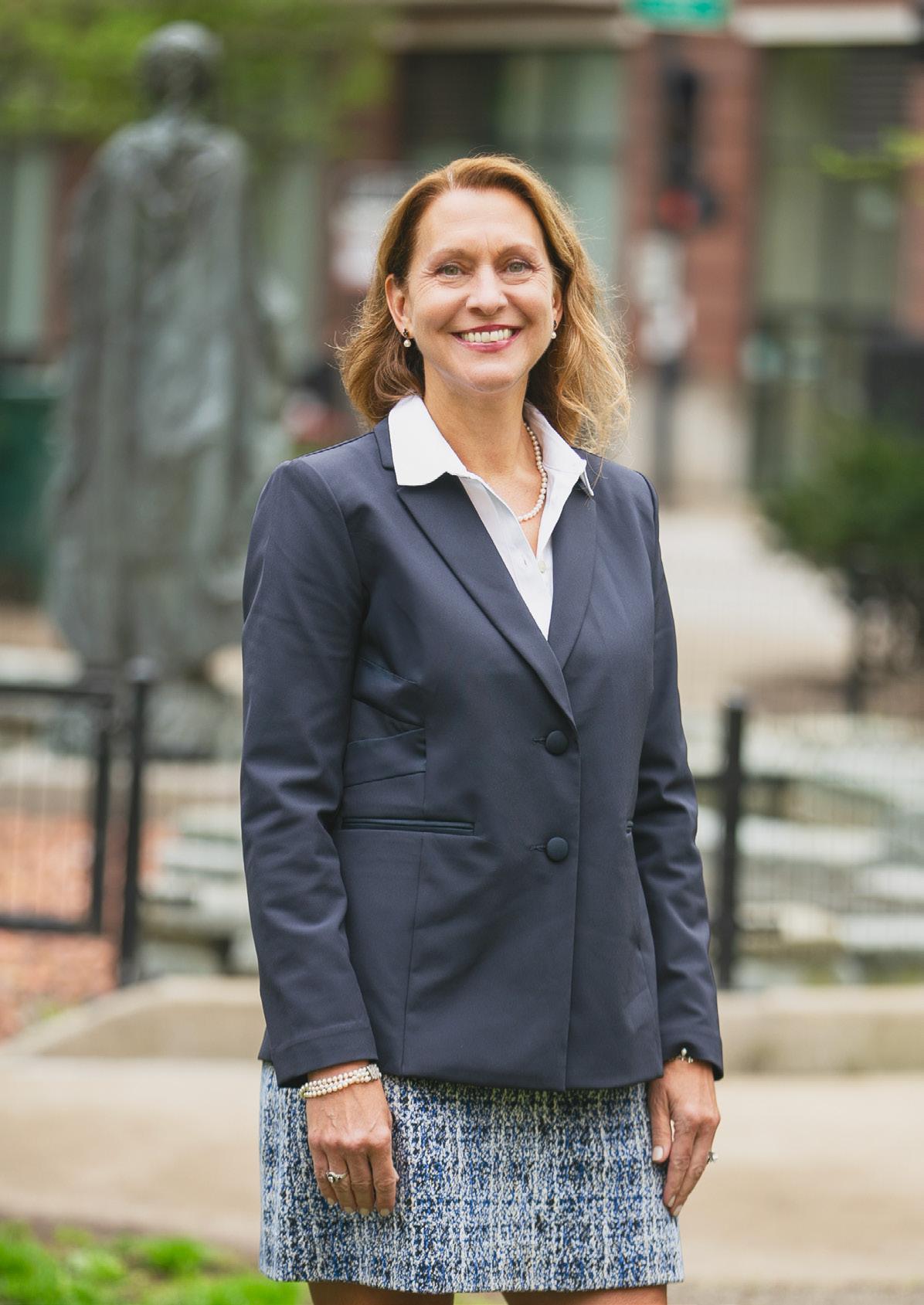
Hands-On Transformation
Alumni Remember the Clinics Where Their Careers Began
SPRING 2024
Administrative Accolades Law After Death First Amendment in the Internet Age Learning to Pivot

Dear Alumni,
AS ANOTHER ACADEMIC YEAR COMES TO A CLOSE, I am thrilled to look back at the success of our students and faculty over the past semester. Your law school is strong, and that is proven in student triumphs at trial advocacy and moot court competitions across the country. I also see Chicago-Kent College of Law’s success in our faculty, who continue to publish award-winning research and earn grants and recognition for their dedication to educating future lawyers.
Our faculty provide students access to high-quality legal education both in the classroom and in the courtroom. As we were putting together this magazine in honor of our clinical programs, we heard time and time again how important hands-on learning is for law students.
Students need to sit in a classroom, study case law, and understand how the law works. But that’s not all that goes into being a successful lawyer. Lawyers are hired to represent clients—real people with real problems and real lives. Whether we represent David or Goliath, we act in our clients’ best interests. Understanding how to do that is something that even the best professors cannot teach in a classroom.
That’s where our talented faculty at the C-K Law Group come in. They not only represent clients as lawyers in a real law firm; they also take our students under their wings and teach them—a process that includes helping students see and hear the people on the other side of the table.
These professors have made a profound difference in the careers of so many Chicago-Kent graduates, and, in this magazine, you can read the stories of four of these graduates.
A Letter From Dean Anita K. Krug
Laura Forester ’91 is an administrative judge at the Illinois Department of Financial and Professional Regulation. She came to that role after years of prosecuting bad actors in the medical field. Laura is often required to decide issues about which there is no case law and, in those cases, has the opportunity to create new case law, thereby influencing Illinois regulation for generations to come.
Brian Warens ’11 is particularly adept at the human element of lawyering. He handles high-level estates and tax gifts and is often confronted with death and loss. He interacts with his clients with empathy and compassion to help them navigate that difficult time.
Monica Whitten ’23 is a recent graduate who already has established a successful career. After years excelling in commercial real estate in Dallas, followed by a decade caring for her family, she came to Chicago-Kent, driven to succeed no matter what obstacles lie in her path. She is now a star law firm associate with a bright future ahead of her.
Lastly, powerful people wanting to take steps to protect their reputation often turn to Ryan Jacobson ’99 for his expertise in First Amendment law. As the internet has proliferated every aspect of society, Jacobson has worked to get ahead of the vitriol and protect that which takes a lifetime to build—a reputation— while safeguarding free speech protections.
These alumni exemplify why hands-on training continues to be a cornerstone of our academic philosophy at Chicago-Kent. Our job is to help our students flourish as attorneys, and we believe the human element is crucial to that success. Our clinical faculty—and our students who learn so much from them— constitute yet another reason why I am proud to be dean of this outstanding institution.
Thank you for your continued support for Chicago-Kent and its clinical programs.
Anita K. Krug Dean and Professor
Chicago-Kent

Features
6 One of Five COVER STORY
Laura Forester ’91 shapes case law that governs licensed professionals in nearly every industry as one of only five administrative judges at the Illinois Department of Financial and Professional Regulation.
8 The Great Protector
Brian Warens ’11 helps families navigate death and all of the legal issues it brings, while never forgetting the importance of offering kindness toward his grieving clients.
10 Never Giving Up
Monica Whitten ’23 wanted to upgrade her career in commercial real estate with a J.D.—until Chicago-Kent College of Law’s tax clinic made her rethink everything.
1 2 Reputation of a Lifetime
Ryan Jacobson ’99 is a guardian of the First Amendment and a leading expert on protecting reputations—a role needed in today’s tech-driven world.
CHICAGO-KENT MAGAZINE
Dean and Professor of Law ANITA K. KRUG
Associate Vice President for Major and Planned Gifts SUSAN M. LEWERS
Senior Director of Constituent Engagement JOSEPH VOLIN
Produced by the Illinois Institute of Technology Office of Marketing and Communications
Content Director ANDREW WYDER
Editor KAYLA MOLANDER
Senior Graphic Designer SCOTT BENBROOK
Photography MICHAEL REITER
Chicago-Kent Magazine is published by Chicago-Kent College of Law, Illinois Institute of Technology, for its alumni and friends.
Address correspondence to Chicago-Kent Magazine, 565 West Adams Street, Chicago, Illinois 60661.
Copyright 2024 Chicago-Kent College of Law, Illinois Institute of Technology
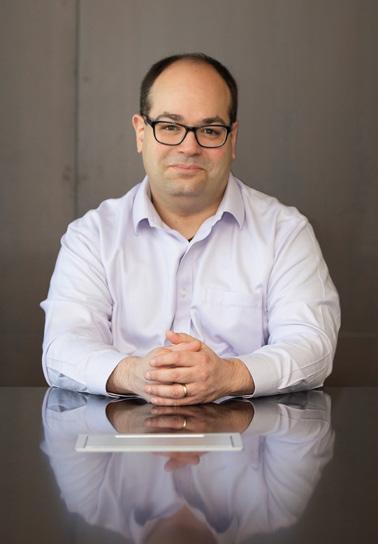


Sections 2 Student/Faculty News 3 Faculty/Law School News 5 Features 14 Opinion 15 Class Notes/In Memoriam
Spring 2024 Magazine 6 8 10 12
HONORS, AWARDS, AND FELLOWSHIPS
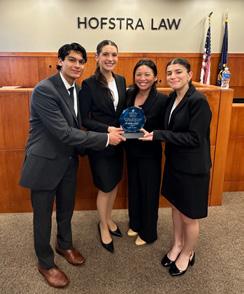
Yoss Arianlou ’25, Victor Chahin ’25, Caroline Woodmancy ’24, and Dulcie Xue ’25 competed in the Hofstra National MedicalLegal Trial Competition, hosted by the Maurice A. Deane School of Law at Hofstra University and the Zucker School of Medicine at Hofstra/Northwell. The team flew to New York to compete in the only competition in the country where a law school and medical school collaborate to simulate real-life expert testimony by doctors. The team was undefeated until the final round, finishing second overall. Chahin earned the tournament’s prestigious Outstanding Attorney award.
At the Buffalo Niagara Trial Competition, hosted by the University of Buffalo School of Law, Emanuel Centeno ’24 won the Best Cross Examination award. Jack DeBacker’24 and Nico Colombo ’25 brought home two trophies from the National Civil Trial Competition at Loyola Law School: Best Closing Argument and Best Direct Examination. The National Trial League Team, comprised of Sandra Khouri ’23, Haya Muhammad ’24, Aaron Hunt ’25, and Samuel Clendenning ’25, won Best Advocate awards for their in-round performances throughout the entire competition season.
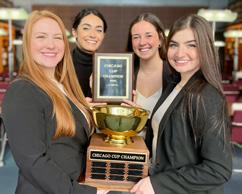
Chicago-Kent College of Law’s team emerged as champions of the inaugural Chicago Cup Tournament, a co-venture of six area law schools, including Chicago-
Kent. The team, comprised of advocates Alexis Beck ’24 and Claire Bullington ’24 and witnesses Melissa McCollum ’26 and Ella Youash ’26, tackled a fictional case based on a real-life FBI operation—Operation Greylord, a sting designed to weed out judicial corruption in Chicago. Beck and Bullington acted as doublesided advocates, representing both the prosecution and the defense. McCollum and Youash served as doublesided witnesses.
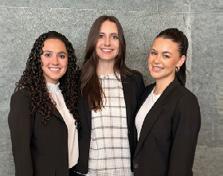
Marisa Gelabert ’24, Helen Gustafson ’24, and Nell Riordan ’24 finished as quarterfinalists and won the Best Brief award at the Civil Rights and Liberties Moot Court Competition at Emory University Law School on October 13–14, 2023.
At the National Health Law Moot Court Competition at Southern Illinois University


School of Law, Manuela Burek ’24 and Paul Ansani ’24 tackled a case of a family discovering that their child, conceived with the help of a fertility doctor, was the biological child of the fertility doctor and not the husband of the child’s mother. The doctor had filed for bankruptcy, tying up the situation in bankruptcy court.

Clarice Fisher ’24 and Evelyn Tarnovsky ’24 finished as quarterfinalists at the Appellate Lawyers Association Moot Court Competition in Chicago on November 3–4, 2023.

At the Hassel National Constitutional Law Moot Court Competition at Regent University School of Law in Virginia Beach, Virginia, Madalynn Mershon ’24,
Full Trial Advocacy team 2 STUDENT/FACULTY/LAW SCHOOL NEWS

Noah Ramirez ’24, and Kayla Farhang ’24 took on a case about a state’s attempts to restrict a social media company’s ability to alter or remove users’ posts that violate their community standards against hate speech, misinformation, and other issues on November 17–18, 2023.
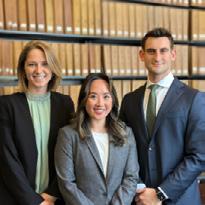
Elizabeth Weber ’24, Anita Huang ’24, and Benjamin Sheinbein ’24 finished as quarterfinalists in the Nationals Moot Court Competition, hosted by the American College of Trial Lawyers and the New York City Bar Association, on November 17–19, 2023.

A second team composed of Erin Gallagher ’24 and Kaitlyn Watkins ’24 won an award for the best brief.
At the University of Houston Law Center’s Hunton Andrews Kurth Moot Court National Championship on January 24–27, 2024, Charlie Johnson ’24 and Steven Criner ’24 finished as quarterfinalists and won an award for third-best brief. Johnson won best speaker.
Joseph Pablo Strom ’25 won the 32nd Annual Ilana Diamond Rovner Appellate Advocacy Competition. Colin Boysen ’25 won outstanding oral advocate and Breck Radulovic ’25 took home best brief prize.
The 2024 Public Interest Awards ceremony was held on April 16, 2024, at
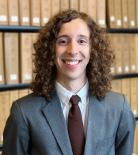
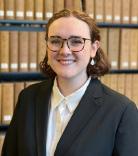
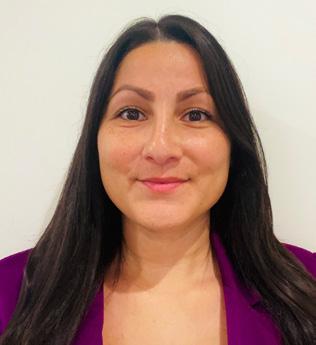
Conviser Law Center. At the ceremony Michelle Vodenik, director of the Public Interest Center, said that in the 2023–24 academic year student volunteer hours increased by 83 percent from the previous year and that the number of students volunteering had doubled. Of the students who began their studies in fall 2023, 74.4 percent signed the pro bono pledge, a commitment to undertake 50 hours of community service during their time in law school.
Jacob Marshall ’24 was the winner of the 2024 Vivien C. Gross Pro Bono and Public Interest Leadership Award. Emile Boghos ’24 received the Pro Bono Leadership Award for completing the most volunteer hours of any graduating student: 812, largely at the Cook County Public Defender’s Office.
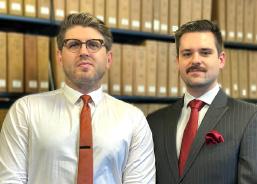
Jacqueline Garcia ’26 has been recognized as one of only eight recipients of the 2024 Federal Magistrate Judges Association (FMJA) fellowship.
As part of the fellowship, Garcia will serve as a judicial extern with a United States magistrate judge, receive a stipend of $2,500, and will have the opportunity to participate in FMJA’s Path to the Bench and federal clerkship programs.
The program was created in partnership with Just the Beginning—A Pipeline Organization, which is committed to helping students, especially students of color and those from underrepresented communities, create a realistic path toward becoming a lawyer, leader, or judge.
“I’m a first-generation law student. Growing up I didn’t know anyone who was in the legal profession. I’m also a non-traditional student,” says Garcia. “Knowing that there were programs like Just the Beginning made me feel like I have a shot, because they’re looking for people like me.”
Colin Boysen
Joseph Pablo Strom
Breck Radulovic
Charlie Johnson and Steven Criner
3 STUDENT/FACULTY/LAW SCHOOL NEWS
Michelle Vodenik [left], Jacob Marshall [center], and Professor Carolyn Shapiro [right] at the 2024 Public Interest Awards ceremony

Chicago-Kent College of Law students completed more than 600 hours of community service during the 2023 Public Service Day. The event takes place as a a part of 1L orientation and is hosted by Chicago-Kent’s Public Interest Center.
The event launched in 2022 and returned this year with more than 200 student volunteers spread out across the city to aid 15 community partners in both legal aid and community projects.
“Engaging in pro bono is important for our law students,” says Michelle Vodenik, director of the Public Interest Center. “They learn how to communicate with clients, issue-spot critical information when a client shares their legal problem, and develop a response that can lead to a solution. These skills are important for all lawyers to develop, and we are excited to bring this to first-year law students at the start of their law school journeys.

Jean M. Wenger, director of the Chicago-Kent College of Law Library and a senior lecturer at the law school, has been inducted into the American Association of Law Libraries Hall of Fame. She was one of four 2023 inductees.
AALL is the national professional association of law librarians and other legal information professionals. The Hall of Fame recognizes professionals who have been members of AALL for more than 25 years and have made significant, substantial, and longstanding contributions to the profession of legal information management, including service to the association, working with outside organizations on behalf of the profession, or serving as exceptional role models for their colleagues.
“Law librarians—we’re one of the best-networked professions in that we always support each other and share our expertise,” Wenger says.

Chicago-Kent College of Law
Professor Sungjoon Cho’s latest book—co-written with Jürgen Kurtz, professor of international economic law at the University of Melbourne in Australia and titled Investing the
ASEAN Way: Theories and Practices of Economic Integration in South East Asia (Cambridge University Press 2022)—was awarded the 2024 Best Book Award from the International Law Section of the International Studies Association. The award annually recognizes a book that “excels in originality, significance, and rigor in the broadly defined field of international law.”
“In Western countries, somehow intellectuals tend to believe their legal system is standard,” says Cho. “That, we try to problematize.”

Chicago-Kent College of Law
Associate Clinical Professor Jamie Franklin, as supervising attorney of the C-K Law Group’s Civil Litigation Clinic, is representing a former Moody Bible Institute professor, Janay Garrick. In a case that could end up in front of the United States Supreme Court, Garrick is suing Moody for sex discrimination under Title VII of the Civil Rights Act of 1964 stemming from her termination in 2018. Moody claims she was fired for not sharing its views on Christianity.
“In the view of Moody Bible Institute, the religious autonomy doctrine should be stretched to the point that it categorically bars all non-religious discrimination and retaliation claims,” Franklin says.

Lewis Collens, professor emeritus at Chicago-Kent College of Law and president emeritus of Illinois Institute of Technology, is one of the 2024 recipients of the Order of Lincoln—Illinois’ highest civilian honor for professional achievement and public service.
The Order of Lincoln was established in 1964 and honors Illinois residents whose work uplifts every community in the state.
In a news release announcing the honorees, Illinois Governor J. B. Pritzker recognized Collens as “a highly respected and recognized leader in higher education.”

Democracy’s Discontent: A New Edition for Our Perilous Times (Harvard University Press 2022), a book written by Michael J. Sandel, Anne T. and Robert M. Bass Professor of Government at Harvard University, is the winner of the 2023 Roy C. Palmer Prize on Democracy, Civil Liberties, and the Rule of Law.
The original version of Democracy’s Discontent was released in 1996, when the end of the Cold War left America’s version
of capitalism dominant on the world stage. However, Sandel argues that under the surface of triumph and peace, concern about the widening divide between the rich and the poor threatened to unsettle the American experiment in self-government.
If an examination of democracy and its discontents was needed in the 1990s, Sandel writes that it’s potentially even more necessary now. He traces the continuing peril facing American democracy through the Clinton-Bush-Obama years and into the Trump administration in an updated version of the legal classic.
Chicago-Kent College of Law alumni feature prominently in the 2024 Super Lawyers list. More than 1,000 ChicagoKent alumni currently make the cut, which ranks third among law schools in the state of Illinois.
Super Lawyers, part of Thomson Reuters, is a rating service that recognizes the top 5 percent of outstanding lawyers who have attained a high degree of peer recognition and professional achievement. The patented selection process combines peer nominations and evaluations with independent research.
A number of Chicago-Kent alumni were also featured in more prestigious categories.

Chicago-Kent College of Law has been awarded a $750,000 grant from the United States Department of Education to teach civics to high school students and their teachers as part of an educational program created in the wake of the January 6, 2021, attack on the U.S. Capitol.
The money will fund a new Chicago-Kentbacked program titled Connecting Past, Present, and Future: Teaching American History and Civics for Empowered Citizenship, which will teach students across Illinois—and their teachers—lessons about how to engage with their democracy.
“If you look around today, you can see that our democracy is in some trouble,” says Carolyn Shapiro, Chicago-Kent professor of law and co-director of the college’s Institute on the Supreme Court of the United States.
FACULTY
NEWS
AND LAW SCHOOL
4 FACULTY/LAW SCHOOL NEWS

Clinical Experience at the C-K Law Group
Many law schools have clinics. Chicago-Kent College of Law’s clinics are unique, in a practical sense: most of them are housed within an actual in-house law firm that is staffed by practicing attorneys. Chicago-Kent’s fee-generating model replicates the experience of a private law firm, allowing students to work on sophisticated litigation and transactional matters within numerous fields while under the supervision of experienced and ethical practitioners.
5
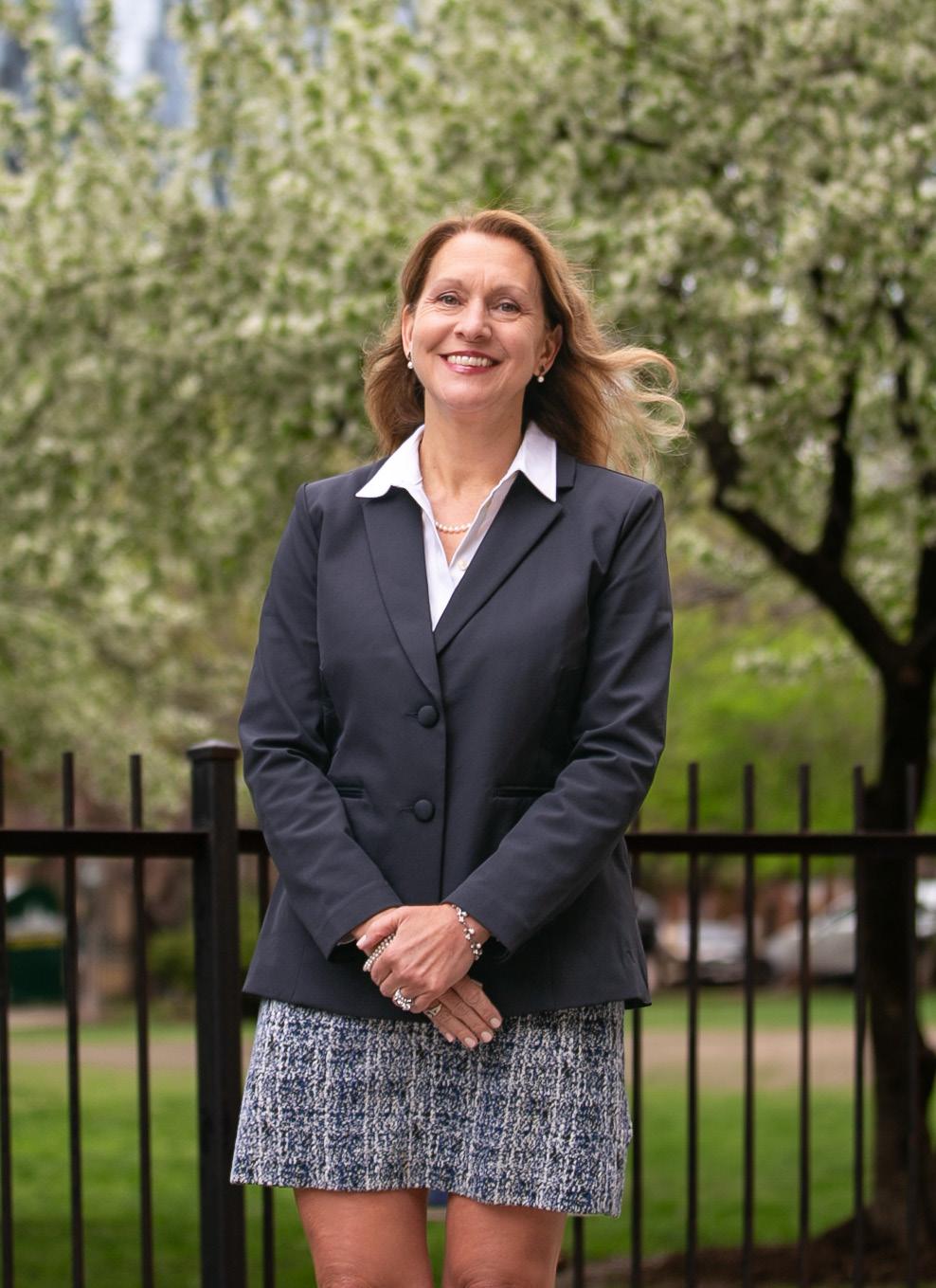
6 Feature: C-K Law Clinics
Anything but Boring
“I LOVE CONDUCTING HEARINGS. Then I get to take time and write an opinion that’s going to be considered by the professional board,” says Laura Forester ’91. “Few judicial positions have both of those components.”
Forester is one of five administrative judges at the Illinois Department of Financial and Professional Regulation (IDFPR). In the role she oversees cases involving the licenses of professionals in every field except lawyers, teachers, and plumbers.
“As an administrative law judge, all kinds of professions come before me: pharmacists, dentists, real estate agents, appraisers,” she says. “They each are their own animal and have their own terminology and semantics.”
She’s been at the IDFPR for 13 years, including seven years as a prosecutor and six as a judge.
Since her cases deal with professional regulation, often there’s no case law or precedent to turn to, so she has to dive into a profession’s regulations to make a ruling in the public’s interest and one that is consistent with other interpretations of professional acts.
“As a prosecutor, for the first time, I had to prosecute a doctor for overprescribing medical cannabis,” she says. “It was a brandnew law, and they were brand-new regulations.”
As a judge, she oversees cases involving all licensed professions, but as a prosecutor, she was chief of medical prosecutions. In that role she was responsible for overseeing all 45,000 licensed doctors in Illinois.
Vladimir Lozovskiy was one of the prosecutors who worked under Forester when she was the chief medical prosecutor.
“She not only had to come and clean up some other stuff—she had to actively take on a huge case load,” he says. “Laura probably had the largest case load outside of me, but I’m only responsible for myself. She was responsible for everybody else, too.”
The two tried cases together for seven years and were honored by the United States Drug Enforcement Administration for their efforts to combat overprescribing of controlled substances. Prior to receiving their certificates of appreciation, their prosecutions resulted in 20 health care professionals receiving discipline for overprescribing.
Forester was also recognized with an Award of Merit from the Federation of State Medical Boards for her work in helping to fight overprescribing.
“When she received the award, she basically said that she was the wrong person, that the reward should go to me,” says Lozovskiy. “It was unexpected and unnecessary, and it just shows her level of selflessness.”
Now that Forester is a judge and Lozovskiy still serves as a prosecutor, their familiarity isn’t always good for him.
“I can’t get away with anything in her court,” he says, laughing. “She knows all my tricks!”
Long before she ran her own courtroom, Forester was a thirdyear law student at Chicago-Kent College of Law with a bad lottery number and a full-time job. She was frantically looking for a course that would satisfy her credit requirements while still allowing her to work. Clinical Professor Richard Kling asked her to join his criminal defense litigation clinic.
A prosecutor at heart, Forester struggled at first with defending people that she believed to be guilty. Kling soon taught her the value of a defense attorney.
“He made it so clear that the most important thing a democratic society can do in order to ensure that there isn’t an abuse of power or that the government isn’t taking actions that violate the Constitution is making sure that your government follows its own rules when it deprives someone of their freedom,” she says.
When she wanted to continue on the path to the Cook County State’s Attorney’s office, Kling was there again to offer a helping hand. He recommended her for a clerkship with Gino DiVito, who was serving as a justice for the Illinois Appellate Court at the time.
During her clerkship she was waiting tables at night and interviewing at prosecutors offices across the country. She wanted to stay in Chicago, but couldn’t get an interview at the Cook County State’s Attorney’s office. DiVito learned that she was on the brink of accepting an offer in Los Angeles and thought it would be a loss for Cook County.
The next day she had an offer from the Cook County State’s Attorney’s office.
“It was because Richard had recommended this intern position with Justice DiVito that I was allowed to demonstrate that I can write and prove that I am worthy of being hired and considered,” she says. “He was the reason that I was able to get my dream job, which was working at the state’s attorney’s office as a prosecutor in the criminal division.”
She held that position for 13 years and loved it. Then, in 2004, she moved to the Illinois Court of Claims to be a clerk for the newly appointed judge: Peter Birnbaum ’83, who is now chief judge. The job would allow her to work part-time from home and be more available for her growing family.
“I hope that someday I can be an example to my daughters that you can have a family and have a balanced life, but also pursue professionally what you’re passionate about.”—Laura Forester
“I’m one of those people that’s fortunate enough to have been able to pursue my career at different times and for different needs,” she says. “I hope that someday I can be an example to my daughters that you can have a family and have a balanced life, but also pursue professionally what you’re passionate about.”
The clerkship opened up new areas of the law for Forester.
She spent seven years at the Court of Claims before she was ready to return to full-time work and started at the IDFPR, where she’s been ever since.
“I was able to balance my passion for being a lawyer and being in the legal profession with trying to be a good mother. My family has always supported me in that,” Forester says. “That gets me up in the morning, to make sure that I set a good example for them and that I do the best job I can for them as a role model, as I do as a judge.”
7
For the People
“I LIKE TO BE COLLABORATIVE. I LIKE TO WORK WITH people,” says Brian Warens ’11. “I want them to be happy and understand the legal work.”
Warens has been at Lavelle Law in Schaumburg, Illinois, in Chicago’s northwest suburbs since 2013. He’s currently a partner who manages high-level estates and trusts.
“You have to be a very good compartmentalizer, especially in the estate planning area,” he says. “You have to be able to connect with your clients on a social and emotional level because this is not fun stuff to talk about. It can affect you as an attorney, too, people that you help and enjoy working with—one day they’re there, one day they’re not.”
Warens came into law school at Chicago-Kent College of Law with a plan to study criminal law, but he leaned into his dueling affinity for tax law when he signed up for the college’s tax clinic.
He was approaching his first summer and needed some practical experience.
“You just don’t see a lot of what that working process looks like unless you’re at a firm working for an attorney,” he says. “Not everyone gets set up with or has the opportunity to jump into a firm between that 1L and 2L year. I did not have a firm lined up and I had an interest in tax law, so it seemed to dovetail together quite well.”
He says that staying in-house was the best decision for him, and may be for others.
“We had practicing attorneys who were also professors,” he says of Chicago-Kent’s clinics. “I think in that sense, they’re even better positioned to pass along the knowledge because they know how to teach. Not all attorneys are natural-born teachers.”
In particular, Warens connected with Chicago-Kent’s director of clinical education, Jonathan Decatorsmith, who helped Warens land his current position at Lavelle.
“He was just a man who was always generous with his time,” he says. “In trying to help his students, it was setting a pretty phenomenal example for any senior attorney to follow.”
With Decatorsmith’s guidance, Warens dove headfirst into tax law.
“It gives you a reason to care. There are real lives affected by what you do, and you want to
knock it out of the park for these people.”
—Brian Warens
He took numerous tax law courses at Chicago-Kent, including LL.M.-level courses. He even went to Oakton College after graduating from Chicago-Kent to get his certificate in professional accounting, although he didn’t actually sit for the certified public accountant exam.
“Jon finally lit that tax fire for me, and it expanded in a lot of different directions and led to me having a huge tax role at my current firm and is a major influence on my career,” Warens says.
In the clinic, Warens found that tax law is about much more than dense codes and income brackets.
“It gives you a reason to care. There are real lives affected by what you do, and you want to knock it out of the park for these people,” he says. “No class is going to adequately prepare you for navigating the dueling complexities of the law and human condition.”
In the beginning of his career, Warens handled plenty of income tax disputes for low-income individuals, who the tax clinic served at the time.
When he graduated, he joined the tax clinic at the Center for Economic Progress as its interim director, where he handled similar cases.
“I would make the best case to the [Internal Revenue Service] that either money isn’t owed or can’t be paid,” he says. “Or that they were never responsible to begin with because their former spouse racked up a lot of debt and never told them about it, and the former spouse always did the returns—that sort of thing.”
Warens remembers saving one woman about $100,000. To this day, it makes him feel good.
But ultimately, he found his passion was in estate and probate work.
“I mostly do what I call the second half of the estate planning process, which is administering the documents, making sure the fiduciaries perform their duties,” he says, “that we have happy beneficiaries, and that the process is as painless a process as possible.”
He’s seen many instances, and perhaps it was even the norm in years past, for attorneys to take a hands-off approach to closing estates. That’s not Warens’ style.
“There’s not as much effort to help clients understand the estate-planning documents,” he says. “They just kind of get handed a pile of papers. I want people to understand why they do these things and how important it is to dot the i’s and cross the t’s.”
At Lavelle, he’s found an outlet to do the work that brings him the most satisfaction.
“We did not have a guardianship or estate administration practice really to speak of before I started here,” he says. “That’s something unique I was able to contribute.”
“If an issue comes up, I usually talk to him before I go look it up myself because he knows the probate code,” says Matthew Sheahin, a fellow partner at Lavelle.
Sheahin has worked with Warens for more than a decade and says Warens’ compassion is what makes him an exceptional attorney.
“A lot of his work dealing with estates either have a disabled elderly person that can’t take care of themselves anymore and now they’re working under a power of attorney or a guardianship that’s supervised by the court,” he says. “In those situations, you have an elderly person in need of protection, and Brian’s a great protector.”
Warens has always been interested in people—he earned his B.S. in psychology from Loyola University Chicago—but working with death and grief has changed him for the better.
“It has taught me to be a more sympathetic, and more grateful human being,” he says. “I just try to be a good person.”
8 Feature: C-K Law Clinics
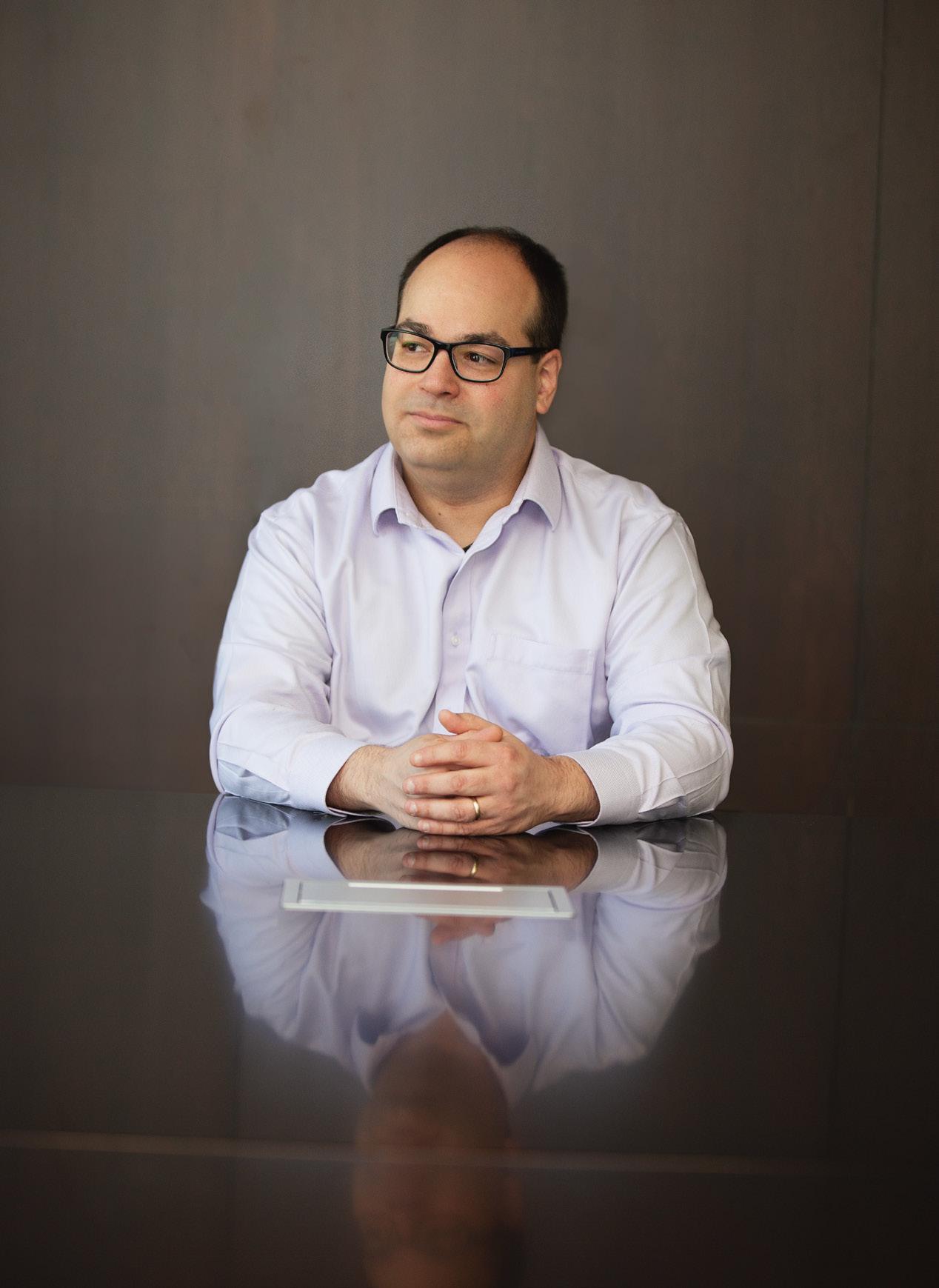
9

10 Feature: C-K Law Clinics
NotYour Typical Lawyer
MONICA WHITTEN ’23 WAS NOT the typical Chicago-Kent College of Law student.
“I was the oldest person in my graduating class, definitely in my section, by a lot of years,” she says. “Initially that was intimidating for me, but it turned out that most of my young friends were very welcoming and even keen to tap into my life experience as a resource.”
Whitten spent 11 years working her way up in the world of commercial real estate investment management, handling large real estate portfolios across the Southern region of the United States starting in 2000.
It wasn’t long before she wanted more.
“Originally I took the LSAT in 2007 or 2008, intending to go to law school then,” she says. “The primary real estate law firm that I worked with offered me a deal. They would cover my salary and law school tuition if I would agree to come work for them for a few years after.”
Life had other plans. Her eldest son fell gravely ill, and in 2011, she stepped away from the workforce to focus on supporting her family.
“I walked away from 90 hours a week, traveling constantly, to mom full time,” she says.
After a decade, her life seemed to stabilize, and she was ready to finally make her dream of going to law school a reality. She applied to the part-time program at the University of Houston Law Center and began studying for the LSATs, only for life to send her another curveball—this one in the form of a divorce during the COVID-19 pandemic.
Whitten was suddenly in need of a scholarship, which the Houston Law Center doesn’t offer to part-time students. Luckily, Chicago-Kent offered her a full ride.
“I ended up in Chicago, and now I’m living the best life I can, I suppose,” she says, fully aware of how unusual her journey seems compared to her classmates.
“I’ve kind of lived my entire life in that way, sort of outside of the box of how things are supposed to go,” she adds. “In my real estate career, I was often the least educated, only woman, and youngest
person sitting at the table. I got comfortable in uncomfortable places.”
All of a sudden, she was no longer the only woman in the room—or the youngest.
“Some of my classmates were younger than my oldest son, which was wild and interesting and completely wonderful,” she says. “It turns out that everyone going through this higher education journey needs support.
“In a lot of ways I had an advantage. For example, I understood how to recognize when people are placing unrealistic expectations on you, and how to navigate that. But I have more responsibilities in my day-to-day life and less support. I’m a single mom living in a city far away from home. I had no family or friends nearby. I didn’t have the time or the flexibility that a lot of my classmates have.”
“I’ve kind of lived my entire life in that way, sort of outside of the box of how things are supposed to go.”—Monica Whitten
Originally, she hoped to pursue real estate law, tapping into her contacts to pick up where she left off.
But yet again, she had to pivot—but this time, it was for her.
“I took a tax clinic class, and I absolutely fell in love with tax law,” she says. “In the tax clinic you learn to read and apply tax code. It’s generally lengthy but well-written administrative law, and you have an opportunity to apply that law to real-life cases involving real people and real outcomes.”
Whitten worked in the tax clinic at Chicago-Kent for two years and didn’t want to leave.
“Everyone should have to take a clinic course to graduate from law school so that you can see what the practice of law looks like before you walk out,” she says. “Many law students haven’t ever had an office job. They haven’t ever had these sorts of demands placed on them. It’s a great time to learn with the guidance and assistance of clinical professors.”
She looked at the possibility of joining the clinic as an associate upon graduation,
but ultimately decided to join the litigation team at Gutnicki LLP, where she gets to use her love of numbers and her skills in finance and real estate to litigate complex business disputes.
John Zummo is a partner at Gutnicki. He describes Whitten as his “go-to associate.”
“Monica is extremely articulate, poised, and organized—for any level attorney, but most certainly for a first year. She’s proactive and has a strong work ethic,” he says. “She has decades of experience as a businesswoman, and that comes across—she handles herself well.”
Whitten is new at the firm, but she’s already finding success.
An appellate brief she worked on led to the New York State Appellate Division affirming a trial court decision in her client’s favor, and that’s just the beginning. She’s excited for new cases, and to use her hard-earned power for good.
“One of the things that I did at the tax clinic was handle most of the clinic’s nonprofit clients,” she says. “I’d like to continue somehow working with nonprofits that either focus on assisting women or assisting children with disabilities.”
Looking back on her career and all the sacrifices that she’s had to make to get where she wants to be, her path isn’t one she would recommend young women aspire to. She thinks that women should never step fully out of the workforce, but if it can’t be helped, learn to be flexible in balancing family and financial independence.
“I gave up my highest-earning-potential years for a marriage that didn’t last,” she says. “Re-entering the workforce in commercial real estate investment management, I would have had to start out below where I left, and risk never really closing that gap financially. Going back to law school helps partially fix that gap in earning potential.
“My story is not unique: women often prioritize their families to promote their husband’s careers, and then have to pivot later in life. I do think that oftentimes women just like me find themselves in situations that weren’t planned for. In that case, going back to law school was great. I had the most fun.”
11
Enhancing His Reputation by
PROTECTING YOURS
“I SPEND MOST OF MY WORKDAYS, helping clients navigate reputation-related challenges. Sometimes I serve as a press liaison or [public relations] strategist during a crisis or political campaign. Other times, I am prosecuting civil defamation, cyber-harassment, or right of privacy actions,” says Ryan Jacobson ’99.
“I am a problem-solver at the end of the day. But I also care about how to message the end result so my client can move forward without the residual heartburn.”
Jacobson has spent his entire legal career at Amundsen Davis. He rose up the ranks from associate to equity member there, and he now serves in management as part of the firm’s Executive Committee.
As a veteran partner at Amundsen Davis, Jacobson counsels a wide range of clients, from prominent celebrities, politicians, and journalists to everyday citizens who are dragged into court for exercising their right to speak freely.
Yet, Jacobson was unwilling to “drop names” or publicize his more high-profile cases.
“My very involvement implies that something was broken that needed fixing,” he says. “I’d like to believe my reputation speaks for itself. Trading on the plight of someone who placed their trust in me seems to defeat the purpose.”
Jacobson was first exposed to First Amendment litigation in a Constitutional Law course at Chicago-Kent College of
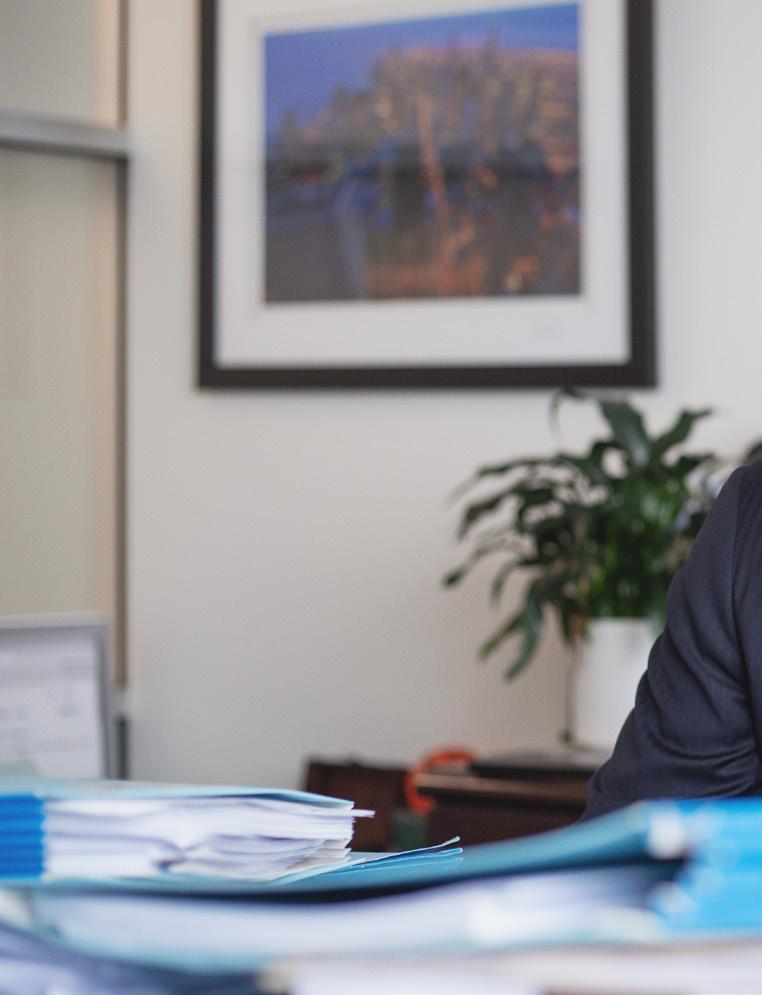
“Today’s tense social and political climate has bred a sort of vigilante justice where everyone has a megaphone and few employ logic or tact.”—Ryan Jacobson
Law—and as a competitor with its Moot Court Honor Society.
In his early days at Amundsen Davis, he remembers a time when his mentor, Larry Schechtman ’83, asked if any associates had an understanding of defamation law. Jacobson was quick to cite his experience from Moot Court, which was enough for Schechtman to assign him the case.
Shortly after that, Jacobson was hired to defend former Illinois Attorney General Jim Ryan during his 2002 campaign for governor against Rod Blagojevich. One of Blagojevich’s affiliates was featured in an attack ad that aired on television during the heated campaign; the individual filed a libel lawsuit against Ryan for defamation.
“I am pretty certain I was in my late 20s and still wearing the suit my parents bought me for graduation. But I didn’t let my age or the gravity of the dispute get in my head or my way,” he says.
The litigation ended in the former attorney general’s favor, which resulted in Ryan referring other work to Jacobson. It
gave Jacobson the boost of confidence he needed to refine his career path.
“I owe it to my firm’s leadership at the time, and especially Larry, who saw a future for me beyond just being his associate,” says Jacobson, who is mentoring younger partners who support his current practice.
Jacobson now chairs the firm’s Entertainment, Media, and Reputation Management practice, which draws in clients from a wide array of industries.
As the internet and social media have become ubiquitous in American society, Jacobson and his team find themselves in uncharted waters.
“The law is shaped by our appellate courts and through state and federal legislation. But it is lagging behind the advancement of so many new technologies, especially artificial intelligence,” Jacobson says. “Like any powerful tool, some will use it to enhance the quality of our lives, while others exploit it in the face of undefined legal and ethical boundaries.”
12 Feature: C-K Law Clinics

For instance, Jacobson’s influencer clients generate income streams that never existed when he was growing up. Other creatives, including musicians and comedians, “garner fame organically by appealing to a massive internet audience instead of hopping from dive bar to comedy club,” he says.
On the flip side, Jacobson says, “Today’s tense social and political climate has bred a sort of vigilante justice where everyone has a megaphone and few employ logic or tact.”
Whether you are a celebrity on the rise or caught in the crossfire of a heated debate, Jacobson says that “our reputation is a prized but fragile possession.”
Steve Bernas, president and CEO of the Better Business Bureau of Chicago and Northern Illinois, knows that for his organization, reputation is paramount.
Jacobson serves as general counsel to the BBB, and he works regularly with Bernas to uphold the organization’s mission.
“The BBB has been around for 100 years, and our website is one of the most
trafficked in the world,” Bernas says. “We’re the sign of a better business, and our reputation is their foundation.”
Bernas says that Jacobson has immersed himself in the work of the BBB and is therefore able to anticipate problems, operate ethically, and diffuse potentially tense situations.
He says that he greatly values Jacobson’s expertise.
“Most of the conversations I have with Ryan are proactive,” Bernas says. “We work in tandem with every company to improve their organization and its relationship with their consumers. The message can sometimes be lost in translation, but Ryan helps us bridge the gap for the betterment of the industry as a whole.”
Through their work together, Bernas has come to see Jacobson as more of an engaged team member than just an outside legal expert. He is impressed by how pragmatic Jacobson can be and appreciates how Jacobson will sometime
insert a pithy analogy or a dose of dad humor to get his point across.
Jacobson’s approach is drawn in part from some of the life lessons emphasized during Clinical Professor Pam Kentra’s Mediation and Dispute Resolution course during his time at Chicago-Kent.
“Professor Kentra taught us to value the human behind every party to a pleading, and to dive into what motivates and upsets them,” he says. “That was probably the most profound gift Professor Kentra and the clinical program imparted to me and to students like me. It helped us realize, at the beginning of our careers, there is more to it than checking boxes and cashing checks. We’re here to help real people solve real problems.
“So many of Chicago-Kent’s professors chose to inspire us in place of regaling us with long-winded ‘war stories’ of their days in practice. I am grateful for my time at Chicago-Kent, the life lessons I took with me, and the countless friends I am still in touch with 25 years later.”
13

To Stop the Bleeding
How can you represent those people?”
For 53 years as a criminal defense lawyer, I have been asked that question by countless others. I’ve asked myself the same question.
I spent 10 years at the beginning of my career as an assistant public defender in Cook County, Illinois, where I mostly tried cases involving serious felonies, including 18 death penalty cases. I’ve been at Chicago-Kent College of Law since 1981, all the while trying the same type of cases while I was teaching and leading law students who enrolled in Chicago-Kent’s Criminal Defense Litigation Clinic.
And the answer to that question? There are a bunch, I suppose.
Because the Constitution entitles these people to effective representation? Maybe.
Because I don’t see my clients (mostly younger folks) out on the street allegedly committing the crimes with which they are charged, but rather see them and their frightened families wondering if they’ll ever come home again? Maybe.
Because I’m aware of the factors—which often include a history of poverty, failed family support, poor education, racism, and a multitude of other factors—that put my clients into the criminal justice system? Surely, that fits, too.
When you put all these factors together, it really comes down to the fact that criminal defense work, to me, is a life’s work. A profession. A calling.
It is perhaps a world apart, but really not much different than that of an emergency room doctor: when a patient comes into the hospital at 2 a.m. bleeding, it doesn’t matter to the doctor whether they are treating the “bad guy” who broke into somebody’s home or if they’re treating the homeowner who was injured. The doctor’s
job is plain and simple: to stop the bleeding—personal feelings, politics, or philosophy aside.
As a criminal defense attorney, my job is to stop, or at least minimize, the bleeding. That is to say, the legal bleeding or the “legal injury” that brought the client’s case to my office. The medicine and bandages that we use are law books, precedents, case analysis. That’s what we do in the criminal division of the Chicago-Kent Law Offices.
The clients that we serve have charges ranging from the relatively minor, to triple murders charged on the federal Racketeer Influenced and Corrupt Organizations (RICO) Act level where the death penalty is still real. The interns (Chicago-Kent students) working under my supervision go out on investigations, interview witnesses, go to the prisons to see clients, research legal issues, prepare motions and memoranda, and, if armed with a 711 license, actually participate in court proceedings.
My students have argued before the United States Seventh Circuit Court of Appeals, as well as Illinois and federal trial and appellate courts.
No kidding: on school breaks when some students are basking in the delicious Florida sunshine, I brag, or bemoan, that my students are often on their computers or out on the streets looking for witnesses!
So, how do we represent these people?
As sincerely, enthusiastically, passionately, compassionately, and effectively as we can. And for me, and most importantly for the client, when our teams of Chicago-Kent Law students are involved, the “dream team” really does exist.
— Richard S. Kling: Clinical Professor of Law
OPINION
14
Class Notes
1969
Bruno Tassone, Indian Head Park, Ill., received the 2023 Justinian Award of Excellence at the 2023 Justinian Society of Lawyers’ Annual Installation and Awards Dinner on September 21, 2023.
1979
Jeffery Leving, Chicago, received the 2023 Presidential Lifetime Achievement Award, along with a proclamation from the Illinois Senate, that recognizes his advocacy for fathers. The Presidential Lifetime Achievement Award is given to recipients “for their lifelong commitment to building a stronger nation through volunteer service.” Leving, who also received the President’s Volunteer Service Award from President George W. Bush in 2006 and the National Lifetime Volunteer Call to Service Award provided by President Barack Obama through the Points of Light Foundation in 2011, is particularly grateful for the recognition from President Joe Biden, whom he worked with when he was vice president and Leving served on Obama’s National Finance Committee.
1984
Jim Beyer, Chicago, recently returned to a full-time labor and employment practice after a brief two-year hiatus to write a legal fiction novel. He is employed by Axiom Global and is providing full-time labor and employment law services to Hilton. Despite having less free time now, in his spare time he enjoys platform tennis, pickleball, kayaking, swimming, biking, and chasing a little white ball around for 18 holes.
Sheila Gutman, Highland Park, Ill., can measure the past year in numbers: 52 days in the hospital, six in intensive care. Eight surgeries, some lasting as long as 13 hours. Twenty-two visits to a hyperbaric chamber. More than two weeks in traction. Double skin grafts. One section of cadaver bone. Also, 365 days without walking. Gutman, a mother of four and a grandmother to five, was among the dozens of people grievously injured when a gunman with an assault rifle opened fire in 2022 on Highland Park’s Fourth of July parade. During her long, arduous recovery, when doctors were not sure that they could save the foot that had been shattered and shredded by a single shot, Gutman began to comprehend how deep Highland Park’s collective trauma ran. Gutman reflected recently in her first interview since the attack: “They now have a burden they did not have previously…a fear that is visceral.”
1988
Joseph Dooley, Chicago, achieved an AV Preeminent® rating for his work representing personal injury victims, which he has done for more than 30 years. An AV rating is considered the highest rating that an attorney can earn in both legal ethics and legal ability. To qualify for an AV
Preeminent® rating, an attorney is required to be reviewed by his or her peers, by the bar, and by the judiciary.
1991
Raj Rajaram, Oak Brook, Ill., published a book titled Climate Change and Environment: How It Impacts Us All in May 2022.
1992
Matthew P. Walsh II, Chicago, was inducted into the Irish American Hall of Fame. The IAHOA is operated by the Irish American Heritage Center and seeks to recognize and honor the outstanding contributions of Irish Americans to society, along with those who have shaped Irish American identity in the United States.
1993
Michael Freeman, Lake Forest, Ill., has been elected to the Executive Committee of Lawyers for Civil Justice’s Board of Directors. Freeman currently serves as senior vice president and chief regulation and litigation counsel at Walgreens Boots Alliance.
1996
Jill Webb, Chicago, was elected secretary of the National American Board of Trial Advocates in October 2023.
Greg Wyler, Stuart, Fla., is preparing to launch one of the largest low-Earth satellite (LEO) constellations in the world with his current venture, E-Space. Wyler has also worked to expand internet access in Rwanda, installing more than 400 kilometers (nearly 250 miles) of fiber optic cable and launching the first 3G network in Africa. With E-Space, which launched in 2022 and has raised more than $90 million in investment capital, Wyler is aiming to clean up space. Wyler maintains close ties to Rwanda, where his two eldest daughters, both teens (Wyler has five kids in all), are leaders of an effort to promote STEM education through a LEGO® robotics league. The younger Wylers have raised more than $500,000 in support of their venture, called STEM Inspires.
1999
Billy Dec, Chicago, a two-time Emmy Award-winning TV personality, actor, attorney, restaurateur, and the CEO/founder of Rockit Ranch Productions, a hospitality and entertainment company that owns and operates celebrated restaurants, has founded the COACT Agency, a cutting-edge marketing agency that leverages top independent talent around the world to align strengths, lower costs, and increase returns.
Sean Swidler, Chicago, served as a guest speaker for Illinois Institute of Technology’s Department of Food Science and Nutrition fall 2023 seminar series. The founder of Swidler Law Group, Swidler gave a presentation titled “Legal Issues for Food and Beverage Startups.”
Jennifer L. Ashley, Chicago, was recently honored by Crain’s Chicago Business as one of its 2024 Notable Women in Law. Ashley joined Salvi, Schostok & Pritchard in 2012, and was named partner in 2014. Since joining the firm, she has personally secured more than $70 million on behalf of her injured clients. She concentrates her legal practice in the areas of personal injury and wrongful death cases that involve car accidents, premises liability, and products liability. Outside the firm, she sits on the board of the Lake County Bar Foundation and is a member of the Jefferson Inn of Courts.
Lou Chronowski, Chicago, joined Barack Ferrazzano Kirschbaum & Nagelberg, LLP as a partner in its renowned Motor Vehicle Group.
2002
Blair Dawson, Chicago, is a distinguished member of the International Association of Privacy Professionals’ Fellowship of Information Privacy and certified by IAPP, including CIPP/US, CIPP/E, and CIPM. Additionally, Dawson is pursuing an M.S. in Cybersecurity, to be completed this fall. Dawson serves as an advisory board member for The Cyber Helpline and as a mentor for the Women in Cybersecurity Mentorship Program. Furthermore, Dawson is an adjunct professor in Chicago-Kent College of Law’s J.D. Certificate in Privacy Law program, which she began in the spring 2024 semester.
2003
Alex Abate, Chicago, recently founded a new law firm, Adeszko Abate & Green, LLC, which is located in Chicago. His firm concentrates its practice on representing injured individuals in personal injury and workers’ compensation claims.
2007
Kristen Prinz, Chicago, was selected as one of Crain’s Chicago Business’ Notable Women in Law for 2024.
2009
Ruth Lopez-McCarthy, Chicago, received the International Award of Merit from Illlinois Institute of Technology. She is a dedicated immigration attorney and community
organizer and was appointed as a senior immigration fellow at the Illinois Department of Human Services in 2021. She has made a significant impact on immigrant and refugee communities at local, national, and international levels. She was the recipient of the 2019 Honorable Abraham Lincoln Marovitz Public Interest Law Award, the 2020 Hispanic Lawyers Association of Illinois Latina Lawyer of the Year, and the 2020 Angel Harvey Family Health Center of the Infant Welfare Society of Chicago Champion for Children Award.
2014
John Buscemi, Chicago, was elevated to partner at the Chicago office of Gordon Rees Scully Mansukhani, LLP on September 1, 2023. Buscemi concentrates his practice on insurance coverage law.
2015
Liz Butler, Chicago, has had an impressive career as a land use attorney, where she works closely with developers, city officials, and community groups to navigate the complex web of regulations and approvals required for large-scale development projects.
Butler was recognized by the Chicago Daily Law Bulletin and Chicago Lawyer magazine as one of the 40 under Forty Illinois Attorneys to Watch in 2021; by REJournals as the 2021 Emerging Leader of the Year; by Leading Lawyers as a 2022 Emerging Lawyer in the areas of Land Use, Zoning, and Real Estate; by Best Lawyers as a 2023 One to Watch; and by Bisnow as the 2023 Leader of the Year in commercial real estate.
2017
Alyssa Jutovsky, Chicago, was promoted to partner in the Investment Funds Group at the Chicago office of Kirkland & Ellis LLP. Jutovsky concentrates her practice on representing private fund sponsors in connection with structuring, negotiating, forming, and operating private investment funds, including buyout funds, growth equity funds, debt funds, real estate funds, and other private investment vehicles, including single-asset funds and special purpose vehicles.
In Memoriam
Marvin D. Michaels ’52
Franklin I. Kral ’55
Albert W. Smith ’55
Peter J. Fasone ’64
Dennis L. Blewitt ’67
Daniel A. Di Sabato ’70
Edward F. Masters ’72
John S. Adler ’73
Robert K. Higginson ’74
Steven H. Jesser ’74
Daniel F. Murray ’74
Thomas J. Rebb ’74
John B. Dale ’76
Samuel D. Johnson ’76
John P. Ley ’76
Patrick C. Doody ’78
James E. Gajda ’78
Richard A. Marsh ’79
Kenneth S. Borcia ’80
Marjorie R. Kohls ’82
Edward C. Erwin ’83
William J. Payne ’84
James M. Jensen ’86
Joann C. Butler ’87
Thomas L. Bartlett-Svehla ’89
Clair L. Penner ’95
James R. Fisher ’98
Jason K. Zachary ’99
Joseph P. Tylutki ’01
15
Power the Difference
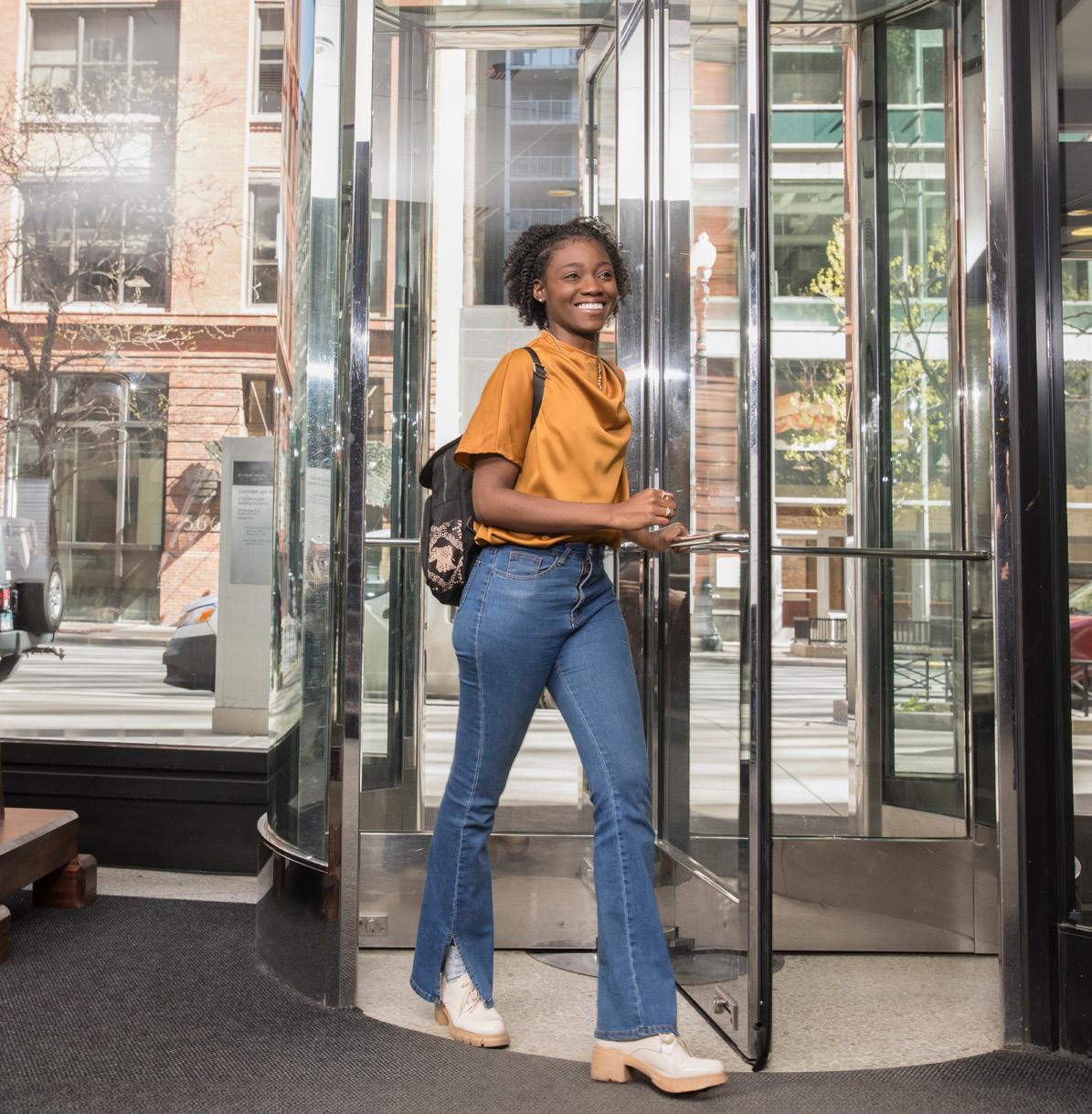
As the leading law school in the country that is affiliated with a technology university, Chicago-Kent College of Law understands the complex ways that tech, law, business, and our world are inextricably linked. That’s why we equip every student with the timeless skills that they need to meet the demands of legal practice today, tomorrow, and far into the future. Starting today, your investment in Chicago-Kent is part of Power the Difference: Our Campaign for Illinois Tech. Thanks to your contribution, students will be immersed in the engaging, hands-on experiences that are crucial to successful careers. Ultimately, your investment will help graduates step into a courtroom, boardroom, or any other room and make an immediate impact.
To learn more and to make a gift, please visit kentlaw.iit.edu/law/alumni
16



































